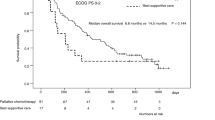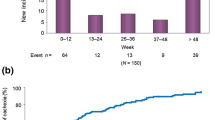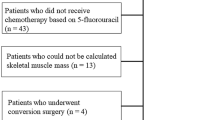Abstract
Aim
Oncologists should carefully weigh up the risks and benefits of palliative chemotherapy in patients with advanced solid tumours (AST) and poor general status from the standpoint both of medical and ethical issues and of healthcare resources required. This study is intended to assess the impact on overall survival of palliative chemotherapy in patients with AST and admitted to hospital as a result of their poor ECOG status.
Materials and methods
We performed a retrospective analysis of 92 hospitalised patients with AST, ECOG 3–4, who were treated with palliative chemotherapy. Uni- and multivariate statistical analyses were conducted to determine the impact of clinical and disease variables (number of previous chemotherapy lines, presence of comorbidities, presentation of anorexia-cachexia syndrome, delirium, dyspnoea, ascitis, brain metastases, T-cell count, albumin, haemoglobin and LDH) on survival in this patient population.
Results
Mean age was 54 years (range 15–80). No chemotherapy had been given for advanced disease in 74%, 13% had received one line, 6% 2 lines and 7% ≥3 lines. Median survival, i.e., after initiation of chemotherapy to death, in these patients was 33 days (range 1–1390). The median of chemotherapy cycles was 1. In the multivariate analysis, no previous chemotherapy, and absence of anorexia-cachexia syndrome and of comorbidities was associated with significantly improved survival in patients. Forty-nine percent of patients died within 30 days of therapy, 28% died between days 30 and 90, and only 23% of patients lived longer than 90 days. Grade 3–4 toxicities mainly entailed blood disorders, namely anaemia 8%, neutropenia 13% and thrombocytopenia 8%. Six patients (5%) developed sepsis after therapy; of these, 3 died from this toxicity, 1 patient suffered cardiac toxicity, one patient leukoencephalopathy and 1 patient acute pulmonary thromboembolism.
Conclusion
Palliative chemotherapy given to patients with AST and ECOG 3–4 with short life expectancy provided no benefit for survival. As a result, we may be over-treating these patients and contributing to poor-quality care.
Similar content being viewed by others
References
Emanuel EJ, Young-Xu Y, Levinsky NG et al (2003) Chemotherapy use among Medicare beneficiaries at the end of life. Ann Intern Med 138:639–643
Earle CC, Neville BA, Landrum MB et al (2004) Trends in the aggressiveness of cancer care near the end of life. J Clin Oncol 22:315–321
Keam B, Oh DY, Lee SH et al (2008) Aggressiveness of cancer-care near the end-of-life in Korea. Jpn J Clin Oncol 38:381–386
Lamont EB, Christakis NA (2003) Complexities in prognostication in advanced cancer: “to help them live their lives the way they want to”. JAMA 290:98–104
Maltoni M, Caraceni A, Brunelli C et al (2005) Prognostic factors in advanced cancer patients: evidence-based clinical recommendations: a study by the Steering Committee of the European Association for Palliative Care. J Clin Oncol 23:6240–6248
Dewys WD, Begg C, Lavin PT et al (1980) Prognostic effect of weight loss prior to chemotherapy in cancer patients. Eastern Cooperative Oncology Group. Am J Med 69:491–497
Rosenthal MA, Gebski VJ, Kefford RF, Stuart-Harris RC (1993) Prediction of life expectancy in hospice patients: identification of novel prognostic factors. Palliat Med 7:199–204
Maltoni M, Pirovano M, Nanni O et al (1997) Biological indices predictive of survival in 519 Italian terminally ill cancer patients. Italian Multicenter Study Group on Palliative Care. J Pain Symptom Manage 13:1–9
Loprinzi CL, Laurie JA, Wieand HS et al (1994) Prospective evaluation of prognostic variables from patient-completed questionnaires. North Central Cancer Treatment Group. J Clin Oncol 12:601–607
Burris HA, Moore MJ, Andersen J et al (1997) Improvements in survival and clinical benefit with gemcitabine as first-line therapy for patients with advanced pancreas cancer: a randomized trial. J Clin Oncol 15:2403–2413
Cunningham D, Pyrhönen S, James RD et al (1998) Randomised trial of irinotecan plus supportive care versus supportive care alone after fluorouracil failure for patients with metastatic colorectal cancer. Lancet 352:1413–1418
Cullen MH, Billingham LJ, Woodroffe CM et al (1999) Mitomycin, ifosfamide, and cisplatin in unresectable non-small-cell lung cancer: effects on survival and quality of life. J Clin Oncol 17:3188–3194
Shepherd FA, Dancey J, Ramlau R et al (2000) Prospective randomized trial of docetaxel versus best supportive care in patients with non-small-cell lung cancer previously treated with platinum-based chemotherapy. J Clin Oncol 18:2095–2103
Doyle C, Crump M, Pintilie M, Oza AM (2001) Does palliative chemotherapy palliate? Evaluation of expectations, outcomes, and costs in women receiving chemotherapy for advanced ovarian cancer. J Clin Oncol 19:1266–1274
Connor SR, Pyenson B, Fitch K et al (2007) Comparing hospice and non-hospice patient survival among patients who die within a three-year window. J Pain Symptom Manage 33:238–246
Glare P, Virik K, Jones M et al (2003) A systematic review of physicians’ survival predictions in terminally ill cancer patients. BMJ 327:195–198
Christakis NA, Lamont EB (2000) Extent and determinants of error in doctors’ prognoses in terminally ill patients: prospective cohort study. BMJ 320:469–472
Maltoni M, Caraceni A, Brunelli C et al (2005) Prognostic factors in advanced cancer patients: evidence-based clinical recommendations-a study by the Steering Committee of the European Association for Palliative Care. J Clin Oncol 23:6240–6248
Mack JW, Cook EF, Wolfe J et al (2007) Understanding of prognosis among parents of children with cancer: parental optimism and the parent-physician interaction. J Clin Oncol 25:1357–1362
Lee SJ, Fairclough D, Antin JH et al (2001) Discrepancies between patient and physician estimates for the success of stem cell transplantation. JAMA 285:1034–1038
Matsuyama R, Reddy S, Smith TJ (2006) Why do patients choose chemotherapy near the end of life? A review of the perspective of those facing death from cancer. J Clin Oncol 24:3490–3496
Smith RC, Zimny GH (1988) Physicians’ emotional reactions to patients. Psychosomatics 29: 392–397
Slevin ML, Stubbs L, Plant HJ et al (1990) Attitudes to chemotherapy: comparing views of patients with cancer with those of doctors, nurses, and general public. BMJ 300:1458–1460
von Gunten CF (2003) Discussing hospice care. J Clin Oncol 21[Suppl 9]:31s–36s
Arkenau HT, Olmos D, Ang JE et al (2008) 90-Day mortality rate in patients treated within the context of a phase-I trial: how should we identify patients who should not go on trial? Eur J Cancer 44:1536–1540
Author information
Authors and Affiliations
Corresponding author
Rights and permissions
About this article
Cite this article
Sánchez-Muñoz, A., Pérez-Ruiz, E., Sáez, M.I. et al. Limited impact of palliative chemotherapy on survival in advanced solid tumours in patients with poor performance status. Clin Transl Oncol 13, 426–429 (2011). https://doi.org/10.1007/s12094-011-0677-y
Received:
Accepted:
Published:
Issue Date:
DOI: https://doi.org/10.1007/s12094-011-0677-y




